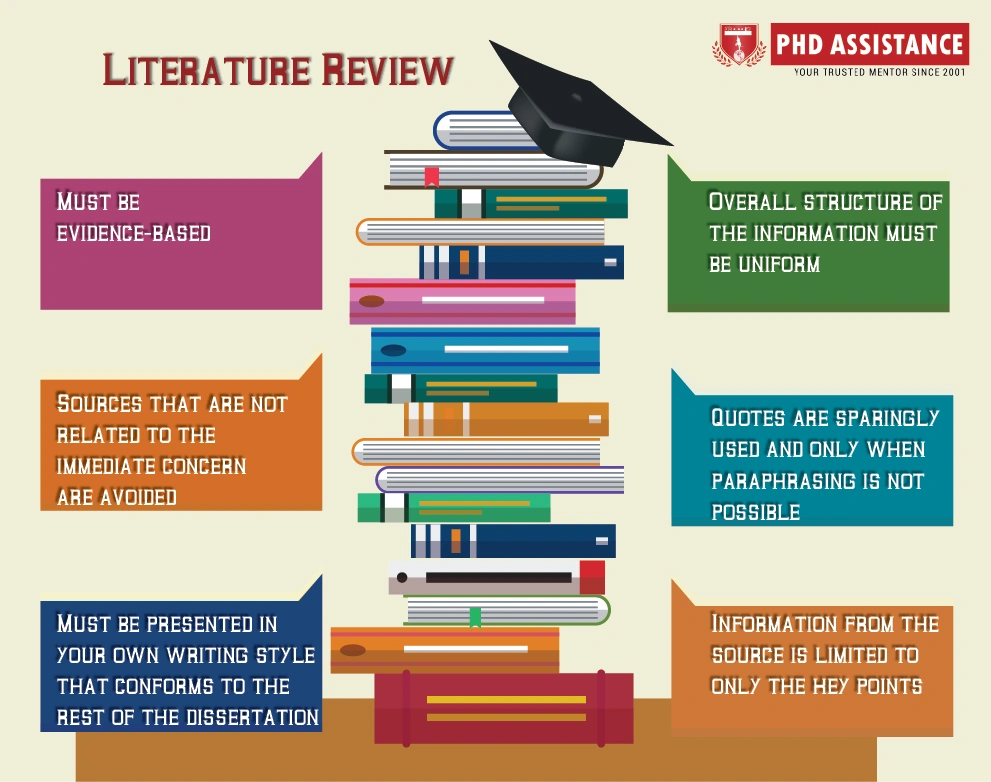How to write a dissertation literature review: an in-depth guide.
Views : 650
Literature review is an analysis of all available relevant literature to the field of study to provide a description, summary, explanation, or critical evaluation of a specific issue, theory, and/ or related concepts. The literature for the field study will include the previous dissertations in the given field, scholarly articles, journals, other scientific works, etc.
In a dissertation, writing literature review is usually the second chapter and introduces the reader to the existing knowledge in the field and provides insight into where the research fits in the field of study.
The literature is scrutinized primarily to facilitate a continuation of study in the field. The review provides information on the researcher’s knowledge in their specialized area. The literature review interprets old information in the light of new information that has since been developed in the field; maps the progress of information in the given field, providing an outline of various schools of thought. Thus, in continuation of informing the readers of the knowledge that exists, enlightens the readers of the gaps that exist in the knowledge while emphasizing the specific gap that forms the nucleus of the research.
The analysis also performs the task of resolving the conflicts between different contradicting studies and providing interconnectivity among all hitherto existing studies in the field. It must also inform of similar researches, if any, conducted in the topic of the research and their limitations, if any.
The most critical function of the literature review is to identify where the research fits into the existing literature of the field and thus reinforces the research’s significance.

General structure of the literature review:
The review begins with an outline of the issue and topic of the investigation and the purpose of the analysis.
It is followed by an overview and classification of all the works that are being reviewed into divisions and subdivisions for an effective argument on the topic discussed with an account of the similarities and differences that exist between the works.
Conclusion of the review contains an account of the works that sound in their argument and the emphasis of the gap in the existing knowledge that will be researched.
So the literature review formulates the problem, the topic that is examined and its component issues; identifies, examines, and evaluates the literature concerning the topic and zeroes in on the most relevant material; concludes the review by analyzing and interpreting valid literature and identifying the gap that is researched.
Crucial things to remember while writing the literature review:
Use Evidence
A literature review section is, in this sense, just like any other academic research paper. Your interpretation of the available sources must be backed up with evidence [citations] that demonstrates that what you are saying is valid.
The section must be based on evidence, which will validate the study.
Limit the information from the source to only the key points. This will eliminate the risk of the literature review being wordy.
Use quotes sparingly and only when paraphrasing is not possible. Otherwise, it will look like your inability to provide a summary or interpret properly.
The literature review, although an account of other authors’ work, must be presented in your own writing style that conforms to the rest of the dissertation. Summarize and synthesize all the materials presented.
Do not lose sight of the overall structure of the information you are presenting; incorporate the context of each work presented.
Avoid sources that are not related to the immediate concern of your research problem.
Be critical of the information you provide, especially from analytical and other secondary sources.
Present your contradictory views about any literature in an unbiased and assertive manner; at the same time, present their views too unambiguously.
Research Help GuideResearch Subject
Related Topics
Latest Research Topics
Gap analysis
dissertation writing services
PhD Literature Review
PhD Guidance
PhD Help
PhD Consultancy Services
Research Article
Literature Review writing



